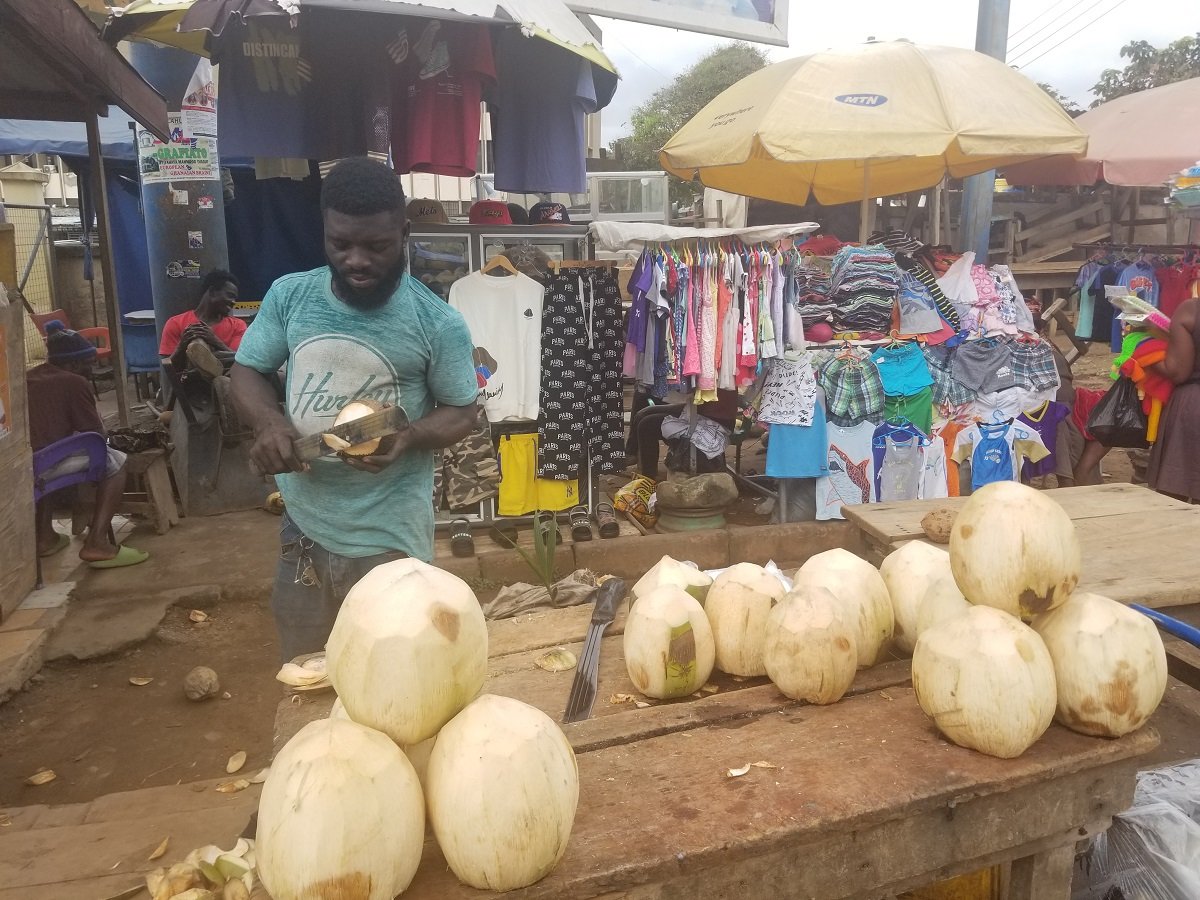News
Ladies reject our proposal, disrespect us… Coconut sellers at K’dua lament

Michael peeling coconut to sell
Coconut sellers in Koforidua are frustrated over the disdain and disrespectful manner customers, particularly young women, deal with them.
Despite playing a vital role in Ghana’s informal sector by providing fresh, nutritious, and affordable drinks, these vendors feel marginalised and belittled by virtue of their occupation.
The worst and painful of all was the blatant manner their proposals to female partners were rejected.
As a result, most of them are single although they are ready to settle down as family men.
In separate interviews with The Spectator, the coconut ‘business moguls’ called for a change in attitude and urged the public to treat them with the decorum and respect accorded to those in the formal jobs.
Michael Adansi, a coconut vendor, highlighted the importance of their service and noted that coconuts, known for their health benefits, offered a refreshing and energy-boosting option for many Ghanaians.
However, he lamented that customers often fail to appreciate the value of their work.
“Young ladies especially look down on us. We can’t even approach them for friendship or relationships because they disrespect us due to the nature of our work and our appearance,” he lamented.
Michael added that even when coconut sellers are fortunate enough to have relationships, they face judgment from their partner’s family once their profession was revealed.
“We endure long hours in difficult conditions, often travelling far to source the coconuts,” Michael revealed, but said despite these efforts, they get insults, dismissive behaviour, and aggressive haggling from customers, even though the coconuts are sold at reasonable prices.
Michael emphasised that they were just trying to earn an honest living and deserve to be respected as legitimate professionals.
Yaw Poku, another vendor, expressed similar frustrations, noting that many customers assume coconut sellers are uneducated or incapable of getting better jobs.
He explained that the stigmatisation was unfair, as many coconut sellers have degrees, diplomas, or are Senior High School graduates.
“They engage in this trade to provide for their families and should be respected for their efforts,” he said and added that, “what people don’t know is that coconut selling requires skills like entrepreneurship, marketing, and customer service,” Yaw added.
In addition to customer disrespect, coconut sellers also face harassment from authorities and market officials, he noted but stated they remained hopeful that by sharing their experiences, the public would come to appreciate their hard work and understand that the dignity of work should not be determined by the type of job, but by the effort and value one brings to the community.
When The Spectator interviewed customers on the issue, responses were varied.
Efua Ansah, a student from Koforidua Technical Institute, pointed out that some coconut sellers do not dress well or package their products properly, a situation she said may contribute to the lack of respect.
She emphasised the importance of hygiene and cleanliness in building customer trust.
However, another customer, Ernest Larbi, defended the sellers, noting that they work under harsh conditions.
“They’re selling in the hot sun in their working gear. It’s not easy, so why disrespect them?” he questioned.
The Eastern Regional Environmental and Health Officer, Mr Prince Kissi, acknowledged the issue and stated that his office was working on strategies to improve the situation.
They have recently designated areas for coconut sellers and are planning a stakeholders’ meeting to train them on better hygiene practices and product presentation, he revealed.
“We have advised them to put on aprons and ensure they dispose of coconut shells properly to enhance their public image,” he explained.
With these initiatives, he hoped that coconut sellers would gain the respect they were demanding and be recognised for their contributions to the community.
News
President Mahama signs book of condolence in honour of late former first lady Nana Konadu Agyeman-Rawlings

President John Dramani Mahama and his wife, Lordina Mahama, have signed the book of condolence in honour of the late former First Lady, Nana Konadu Agyeman-Rawlings.
The visit took place on Tuesday, October 28, 2025, at the family’s residence in Accra.
It followed widespread media reports confirming that the former First Lady had passed away at the Greater Accra Regional Hospital.
In his condolence message, President Mahama paid glowing tribute to Nana Konadu, describing her as a dedicated leader and a tireless advocate for women’s empowerment.
“Ghana is proud of your achievements in your 19 solid years as First Lady and ‘Mother of the Nation.’ While we are all saddened by your passing, we celebrate your life,” the President wrote.

He noted that her passing was especially painful as it came at a time when preparations were underway to mark the fifth anniversary and final funeral rites of her late husband, former President Jerry John Rawlings.
“You fought a good fight and deserve a peaceful rest,” his message concluded.
Nana Konadu Agyeman-Rawlings, wife of the late former President Jerry John Rawlings, served as Ghana’s First Lady from 1981 to 2000.
She was the founder of the 31st December Women’s Movement and is remembered for her lifelong commitment to advancing women’s rights and national development.
By: Jacob Aggrey
News
Paul Adom-Otchere clarifies lawsuit against special prosecutor

The former Board Chairman of the Ghana Airports Company Limited (GACL), Paul Adom-Otchere, has explained that his recent legal action against the Office of the Special Prosecutor (OSP) is not to stop the anti-graft body from accessing his asset declaration details.
In a statement issued on Tuesday, Mr. Adom-Otchere said reports suggesting that he was trying to block the OSP from obtaining information on his assets were misleading.
According to him, he had already completed and submitted the asset declaration forms requested by the OSP on October 23, 2025.
He also attached a letter of protest on the same date to express his concerns about certain aspects of the process.
“As a matter of record, the OSP’s asset declaration forms have been completed and submitted,” the statement read.
Mr. Adom-Otchere stressed that he remains committed to cooperating with the OSP to bring finality to the matter.
He explained that the purpose of his court action is simply to “settle the law and procedure on the matter” not to obstruct the OSP’s work.
The OSP had earlier directed Mr. Adom-Otchere to declare his assets as part of an ongoing investigation, prompting him to seek clarification from the court on the legality of that directive.
By: Jacob Aggrey






